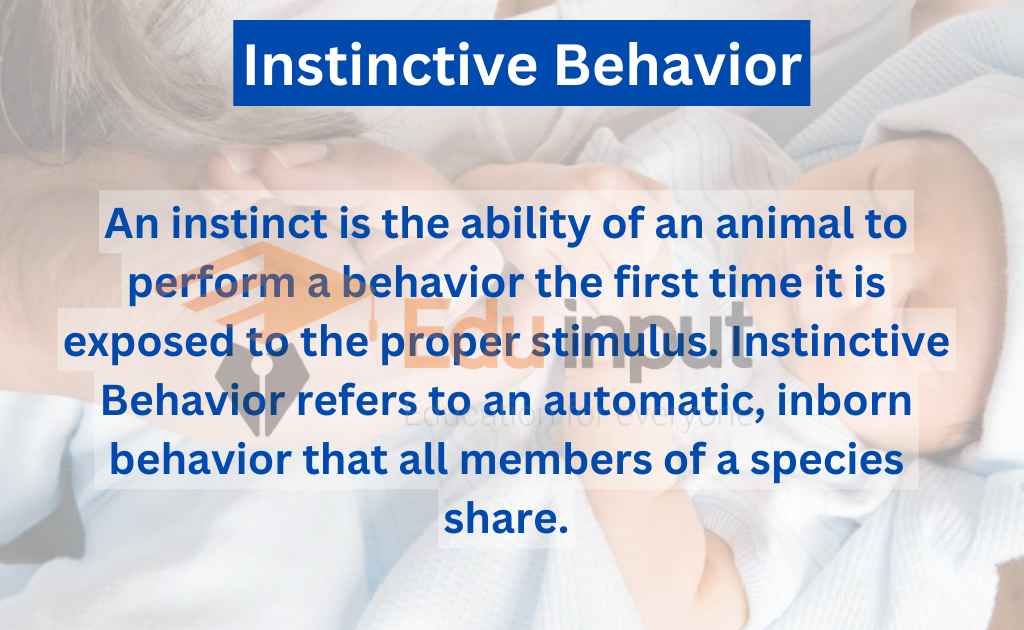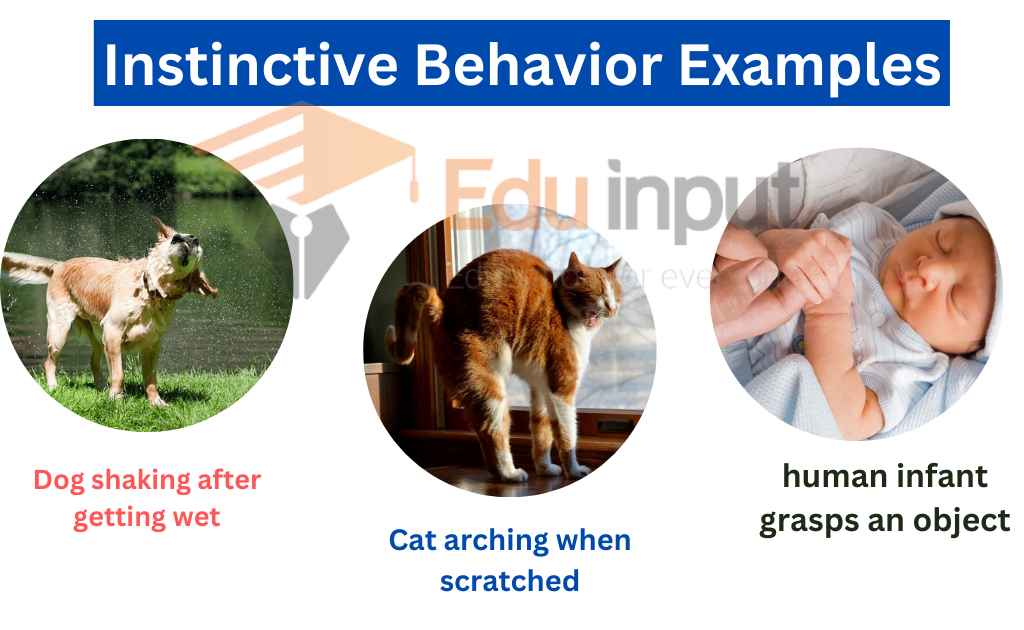Instinctive Behavior-History, Control, and Examples | Freud’s Theory Of Instinct
Instinctive Behavior refers to an automatic, inborn behavior that all members of a species share. It is different from learned behavior. Instinctive Behavior is passed down from one generation to the next through genes. The exact definition of instinct is still A matter of contention. it can be described as a behavior done without conscious thought. Instincts play an important role in the survival of all animal species.
Sleep is thought to be an instinct because it involves the coordination of the entire body and is not completely controlled by our internal systems. Before we sleep, our body signals that it’s time to rest. During sleep, we go through cycles of deep and light sleep. Our brain must be at a specific level of activity for sleep to occur properly. Source

Key Points
- Instinctive behavior refers to a natural, automatic behavior that all members of a species share, passed down through genes.
- Instinctive behavior is innate and doesn’t require learning or teaching.
- The concept of instinct has been used to explain different aspects of behavior, including reflexive actions, innate tendencies, strong urges, knowledge without learning, and more.
- Sigmund Freud’s theory of instinct includes two instincts: life (Eros) and death (Thanatos) and the role of unconscious and conscious mind, personality, defense mechanisms, and psychosexual stages.
- The hypothalamus is a part of the brain that helps to control instinctive behaviors, but its exact function is still not fully understood.
- Animals can control their instinctive responses based on their environment and past experiences.
- Instinctive behavior examples in animals include migrating birds, reflexes, dogs shaking its body, sea turtles seeking the ocean, bird migration before winter, taxis and kinesis, fixed action patterns, and more.
Instinctive Behavior
Instinctive behavior is a natural action that all members of a species perform in response to a specific stimulus. it is present by birth and doesn’t need to be learned by an animal, this is the reason it is called innate behavior.
Reflexes are a good example of instinctive behaviors. For example, birds build nests, and mothers take care of their babies, without having to be taught. These actions happen automatically and are a part of what makes them who they are as a species. It’s like they are born knowing how to do these things.
History Of Instinctive Behavior
The concept of instinct has been used to refer to a variety of different things related to animal behavior. It has been used to describe reflexive or repeating actions, a feeling that comes without explanation. It might be used to describe a natural talent or tendency, a strong urge or desire, ways of acting without learning or experience, or knowledge that is inborn or subconscious. The meaning of instinct can depend on the context in which it is being used.
The meaning of instinct can be difficult to pin down because it can refer to so many different aspects of behavior. There is a long-standing debate over whether behavior, intelligence, abilities, and character are products of genetics or environmental factors, and the concept of instinct is often at the center of this debate.
Even Charles Darwin, who was a well-known naturalist, believed that genetics would lead to development that was not influenced by experiences.
Darwin’s theory of evolution influenced the study of the mind. He saw mental differences between humans and animals quantitatively. He documented observations of animal behavior during his voyage on the Beagle and had a personal interest in the origins of behavior. source
Freud’s Theory Of Instinct
Sigmund Freud was a famous psychologist who wrote a book called ”Beyond the Pleasure Principle”. In his book, he discussed about the idea of Eros, which he saw as the drive for life. It included our sexual instincts, the need to survive, and things like hunger and thirst.
Freud believed that the concept of instinct is important to understanding human nature and behavior. He considered instincts as the driving force behind human behavior and plays a role in all three of his psychic models. According to Freud, understanding instincts is the key to understanding human nature. source
Freud believed there were two types of instincts; Eros and Thanatos. Eros was the life instinct, that included things like sexual procreation and pleasure. Thanatos was the death instinct and that referred to things like self-harm and destruction.
He proposed the following points:
- Unconscious mind
- Personality
- Life and death instincts
- Mechanisms of defense
Role Of Hypothalamus In Expressing Instinctive Behaviors
The hypothalamus is a part of the brain that helps control instinctive behaviors, but scientists are still trying to figure out how it exactly works. It’s sometimes called the “reptilian brain”, but it’s much older than that type of brain.
Studies have shown that while the hypothalamus helps control how our body reacts to emotions, it doesn’t control or create our emotions. Although scientists have developed some understanding of the structure of the hypothalamus, but they still don’t know exactly how it controls our actions.
So far, the best understanding is that the hypothalamus helps coordinate our body’s reaction to emotions, but it’s not the main source of our emotions and instincts. These are influenced by different parts of our body and brain working cooperatively. source
Can Animals Control Their Instinctive Behaviors?
It has been observed that animals can change their instinctive responses based on their environment. For example, if an animal is bullied by other animals, it may become more avoidant of social interactions, which can last for several weeks even if it is not further bullied.
Animals have a basic understanding of the phenomenon that how this adaptation works. Their past experiences can influence the brain regions that control our instinctive behaviors, such as fear responses, and then suppress them. Researches has shown that this mechanism is also found in primates, including humans.
Additionally, our ability to control our instinctive behaviors increases during adolescence. When we start interacting with others and need to regulate our instincts to balance our own needs with those of our social group.
Instinctive Behavior Examples in Animals
1. Migrating birds use innate behavior for timing and route
2. Instincts include: seeking, anger, fear, panic-grief, care, pleasure/lust, and play
3. Dog shaking after getting wet
4. Sea turtle seeking ocean after hatching
5. Bird migrating before winter
6. Reflexes
7. Taxis and kinesis
8. Fixed action patterns and stereotypy
9. Circadian rhythms
10. Knee-jerk reflex
11. Newborn sucking reflex
12. Cat arching when scratched




Leave a Reply